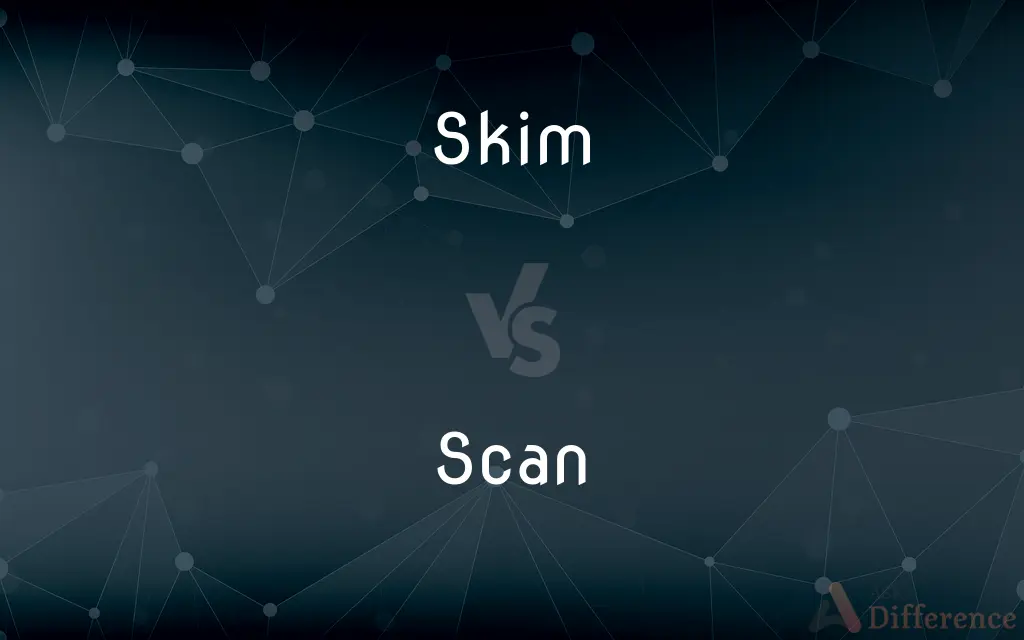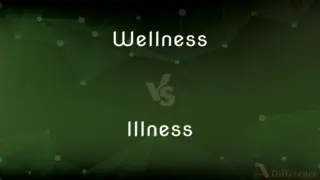Skim vs. Scan — What's the Difference?
By Fiza Rafique & Urooj Arif — Updated on May 8, 2024
Skim means quickly reading over text to grasp the main idea or gist, while scan means looking through text for specific information or details.

Difference Between Skim and Scan
Table of Contents
ADVERTISEMENT
Key Differences
Skim refers to rapidly glancing through a text to catch general themes, main arguments, or an overview. For example, one might skim a report to understand its main points without diving into the specifics. Scan, on the other hand, involves searching the text for particular keywords, phrases, or data. This could include scanning a document for a particular term or figure.
Skimming prioritizes identifying broad content and familiarizing oneself with the general structure of the material. It's useful for getting a basic understanding when reading for comprehension. Scanning, however, is focused and precise, meant to quickly locate relevant information amidst a sea of data.
Skimming is often the first step in assessing a text's value or relevance. In contrast, scanning is a search strategy that comes into play when one knows exactly what they're seeking.
While skimming might be employed for newspapers or novels to pick up key insights quickly, scanning is commonly used with technical documents or references where the aim is to find specific answers or facts.
Comparison Chart
Definition
Quickly reading to understand the gist
Searching for specific details
ADVERTISEMENT
Purpose
Grasp main ideas
Locate particular information
Focus
General themes, structure
Keywords, phrases, data
Usage Context
Articles, reports, novels
Technical documents, manuals, references
Example
Skim a book to identify its main theme
Scan an index for a specific topic
Compare with Definitions
Skim
Quickly browse for the main idea.
She skimmed the article to understand its general message.
Scan
Look over text for specific details.
He scanned the document for the client's address.
Skim
Read quickly without focusing on details.
He skimmed the news headlines before heading to work.
Scan
Search systematically.
The detective scanned the files for any relevant clues.
Skim
Read superficially.
I skimmed through the book but didn't read all the chapters.
Scan
Glance through quickly to find information.
I scanned the contract for any hidden fees.
Skim
Glance over to identify key points.
Students are taught to skim textbooks before exams.
Scan
Survey or scrutinize carefully.
The lifeguard scanned the pool for swimmers in distress.
Skim
Cover a surface lightly.
The breeze skimmed the lake, creating gentle ripples.
Scan
Examine an image electronically.
She scanned the photograph to make a digital copy.
Skim
To remove floating matter from (a liquid).
Scan
To look at carefully or thoroughly, especially in search of something; examine
The sailor scanned the horizon for signs of land.
Skim
To remove (floating matter) from a liquid.
Scan
To look over quickly or read hastily
I scanned the newspaper while eating breakfast.
Skim
To embezzle (money) by taking a small portion on each transaction
Corrupt governments skimming money from foreign aid.
Scan
(Computers)To search (stored data) automatically for specific data.
Skim
To fail to declare part of (certain income, such as winnings) to avoid tax payment.
Scan
To direct a finely focused beam of light or electrons in a systematic pattern over (a surface) in order to reproduce or sense and subsequently transmit an image.
Skim
To copy information from (a credit card) as part of a skimming fraud.
Scan
To direct a radar beam in a systematic pattern across (a sector of sky) in search of a target.
Skim
To coat or cover with a thin layer
"the still, shallow water solidly frozen and skimmed with white" (Barbara Hurd).
Scan
To encode (text, for example) in digital format by means of an optical scanner.
Skim
(intransitive) To pass lightly; to glide along in an even, smooth course; to glide along near the surface.
Scan
(Medicine)To direct x-rays or other energy at (a body or body part) in order to produce an image, as with a CT scanner.
Skim
(transitive) To pass near the surface of; to brush the surface of; to glide swiftly along the surface of.
Scan
To pass (luggage, for example) through a detector at a security checkpoint in order to detect weapons or banned materials.
Skim
To hasten along with superficial attention.
Scan
To analyze (verse) into metrical patterns.
Skim
To put on a finishing coat of plaster.
Scan
To analyze verse into metrical patterns.
Skim
(transitive) To throw an object so it bounces on water.
Skimming stones
Scan
To conform to a metrical pattern
Does this line scan?.
Skim
(intransitive) To ricochet.
Scan
The act or an instance of scanning
My scan of the files.
Skim
(transitive) To read quickly, skipping some detail.
I skimmed the newspaper over breakfast.
Scan
The action or process of scanning a body or body part.
Skim
(transitive) To scrape off; to remove (something) from a surface
Scan
An image produced by scanning.
Skim
(transitive) To clear (a liquid) from scum or substance floating or lying on it, by means of a utensil that passes just beneath the surface.
To skim milk
To skim broth
Scan
(transitive) To examine sequentially, carefully, or critically; to scrutinize; to behold closely.
She scanned the passage carefully but could not find what she was looking for.
Skim
(transitive) To clear a liquid from (scum or substance floating or lying on it), especially the cream that floats on top of fresh milk.
To skim cream
Scan
(transitive) To look about for; to look over quickly.
He scanned the horizon.
Skim
To steal money from a business before the transaction has been recorded, thus avoiding detection.
Scan
To inspect, analyse or go over, often to find something.
To scan the hard drive for errors
Skim
To surreptitiously scan a payment card in order to obtain its information for fraudulent purposes.
Scan
To perform lexical analysis; to tokenize.
Skim
(intransitive) To become coated over.
Scan
To create an image of something with the use of a scanner.
To scan a photograph
To scan internal organs by means of computed tomography
Pencil drawings don't scan very well.
Skim
(of milk) Having lowered fat content.
Scan
To read with an electronic device.
To scan a barcode
To scan a QR code
Skim
A cursory reading, skipping the details.
Scan
To mount by steps; to go through with step by step.
Skim
(informal) Skim milk.
Scan
To read or mark so as to show a specific metre.
To scan verse
Skim
The act of skimming.
Scan
(intransitive) To conform to a metrical structure.
Skim
That which is skimmed off.
Scan
Close investigation.
Skim
Theft of money from a business before the transaction has been recorded, thus avoiding detection.
Scan
(computing) An instance of scanning.
The operators vacated the room during the scan.
Skim
To clear (a liquid) from scum or substance floating or lying thereon, by means of a utensil that passes just beneath the surface; as, to skim milk; to skim broth.
Scan
(computing) The result or output of a scanning process.
The doctors looked at the scans and made a diagnosis.
Skim
To take off by skimming; as, to skim cream.
Scan
To mount by steps; to go through with step by step.
Nor stayed till she the highest stage had scand.
Skim
To pass near the surface of; to brush the surface of; to glide swiftly along the surface of.
Homer describes Mercury as flinging himself from the top of Olympus, and skimming the surface of the ocean.
Scan
Specifically (Pros.), to go through with, as a verse, marking and distinguishing the feet of which it is composed; to show, in reading, the metrical structure of; to recite metrically.
Skim
Fig.: To read or examine superficially and rapidly, in order to cull the principal facts or thoughts; as, to skim a book or a newspaper.
Scan
To go over and examine point by point; to examine with care; to look closely at or into; to scrutinize.
The actions of men in high stations are all conspicuous, and liable to be scanned and sifted.
Skim
To pass lightly; to glide along in an even, smooth course; to glide along near the surface.
Not so when swift Camilla scours the plain,Flies o'er the unbending corn, and skims along the main.
Scan
To examine quickly, from point to point, in search of something specific; as, to scan an article for mention of a particular person.
Skim
To hasten along with superficial attention.
They skim over a science in a very superficial survey.
Scan
To form an image or an electronic representation of, by passing a beam of light or electrons over, and detecting and recording the reflected or transmitted signal.
Skim
To put on the finishing coat of plaster.
Scan
The act of scanning; systematic examination of a prescribed region;
He made a thorough scan of the beach with his binoculars
Skim
Contraction of Skimming and Skimmed.
Scan
An image produced by scanning;
He analyzed the brain scan
You could see the tumor in the CAT scan
Skim
A thin layer covering the surface of a liquid;
There was a thin skim of oil on the water
Scan
Examine minutely or intensely;
The surgeon scanned the X-ray
Skim
Reading or glancing through quickly
Scan
Examine hastily;
She scanned the newspaper headlines while waiting for the taxi
Skim
Travel on the surface of water
Scan
Make a wide, sweeping search of;
The beams scanned the night sky
Skim
Move or pass swiftly and lightly over the surface of
Scan
Conform to a metrical pattern
Skim
Examine hastily;
She scanned the newspaper headlines while waiting for the taxi
Scan
Move a light beam over; in electronics, to reproduce an image
Skim
Cause to skip over a surface;
Skip a stone across the pond
Scan
Read metrically;
Scan verses
Skim
Coat (a liquid) with a layer
Scan
Obtain data from magnetic tapes;
This dictionary can be read by the computer
Skim
Remove from the surface;
Skim cream from the surface of milk
Skim
Read superficially
Skim
Used of milk and milk products from which the cream has been removed;
Yogurt made with skim milk
She can drink skimmed milk but should avoid butter
Common Curiosities
How is scanning different from skimming?
Scanning is more targeted, focusing on finding specific information rather than general comprehension.
What type of reading is skimming ideal for?
Skimming is ideal for newspapers, articles, or long reports where a quick overview is needed.
What does it mean to skim a text?
Skimming involves reading rapidly to understand the main ideas or general structure.
Is scanning an effective study technique?
Yes, it's effective for quickly finding answers or relevant sections in textbooks.
Can skimming result in missing crucial information?
Yes, as skimming overlooks specific details in favor of general understanding.
Is scanning suitable for reading novels?
Not usually, as novels require comprehensive reading, but scanning could help locate specific passages.
Is skimming useful for exam preparation?
Yes, skimming helps get an overview of study materials to focus on essential topics.
When is it better to scan than to skim?
Scanning is more effective when searching for particular keywords, data, or answers.
Can skimming help in identifying relevant content?
Yes, skimming can help assess if a document contains useful information.
Is skimming considered superficial reading?
Yes, as it only covers the main points without delving into detailed comprehension.
Is scanning effective for research purposes?
Yes, scanning helps quickly locate specific data in research documents.
Can scanning and skimming be used together?
Absolutely, you can skim a document for a general understanding and then scan it to find specific details.
What does it mean to scan an image?
Scanning an image means converting it into a digital format using a scanner.
Are skimming and scanning always done manually?
Not necessarily; automated tools can skim and scan documents digitally.
Does scanning require any particular reading skill?
It requires the ability to quickly recognize patterns or keywords relevant to the search.
Share Your Discovery

Previous Comparison
Ghee vs. Dalda
Next Comparison
Wellness vs. IllnessAuthor Spotlight
Written by
Fiza RafiqueFiza Rafique is a skilled content writer at AskDifference.com, where she meticulously refines and enhances written pieces. Drawing from her vast editorial expertise, Fiza ensures clarity, accuracy, and precision in every article. Passionate about language, she continually seeks to elevate the quality of content for readers worldwide.
Co-written by
Urooj ArifUrooj is a skilled content writer at Ask Difference, known for her exceptional ability to simplify complex topics into engaging and informative content. With a passion for research and a flair for clear, concise writing, she consistently delivers articles that resonate with our diverse audience.













































